Abstract
In previous studies of delayed reinforcement, response rate has been found to vary inversely with the response-reinforcer interval. However, in all of these studies the independent variable, response-reinforcer time, was confounded with the number of reinforcers presented in a fixed period of time (reinforcer frequency). In the present study, the frequency of available reinforcers was held constant, while temporal separation between response and reinforcer was independently manipulated. A repeating time cycle, T, was divided into two alternating time periods, tD and tΔ. The first response in tD was reinforced at the end of the prevailing T cycle and extinction prevailed in tΔ. Two placements for tD were defined, an early tD placement in which tD precedes tΔ and a late tD placement in which tD follows tΔ. The duration of the early and late tD was systematically decreased from 30 seconds (i.e., tD = T) to 0.1 second. Manipulation of tD placement and duration controlled the temporal separation between response and reinforcement, but it did not affect the frequency of programmed reinforcers, which was 1/T. The results show that early and late tD placements of equal duration have similar overall effects upon response rate, reinforcer frequency, responses per reinforcer, and obtained response-reinforcer temporal separation. A stepwise regression analysis using log response rate as the dependent variable showed that the obtained delay was a significant first-step variable for six of eight subjects, with obtained reinforcer frequency significant for the remaining two subjects.
Keywords: variable-delay schedules of reinforcement, reinforcement delay, delay-reduction hypothesis, key peck, pigeons
Full text
PDF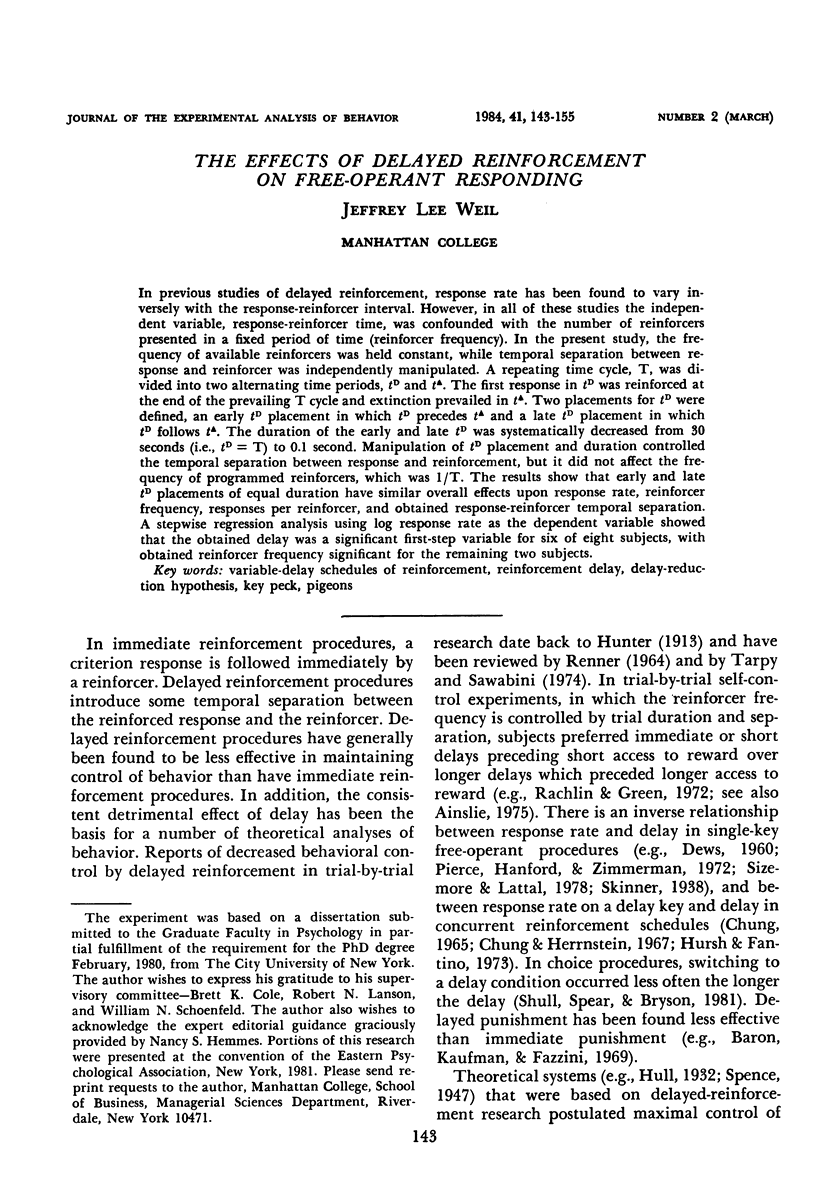
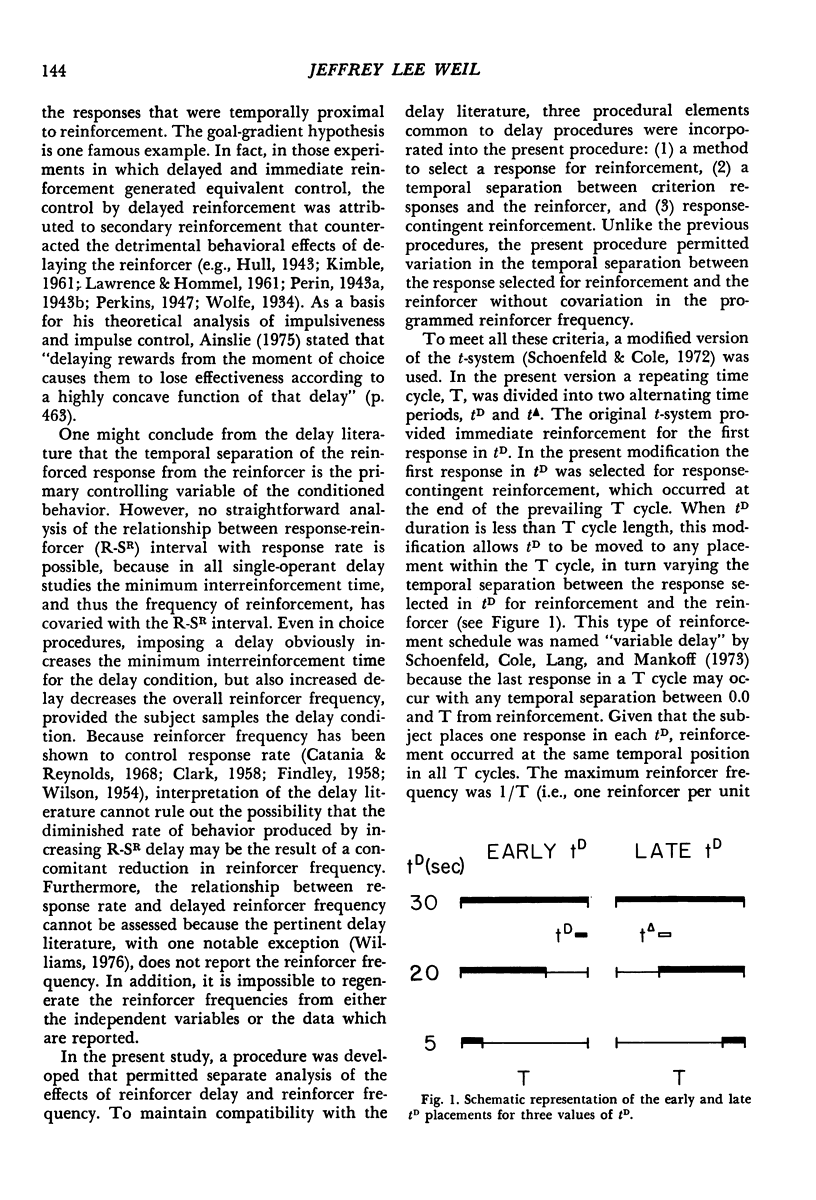

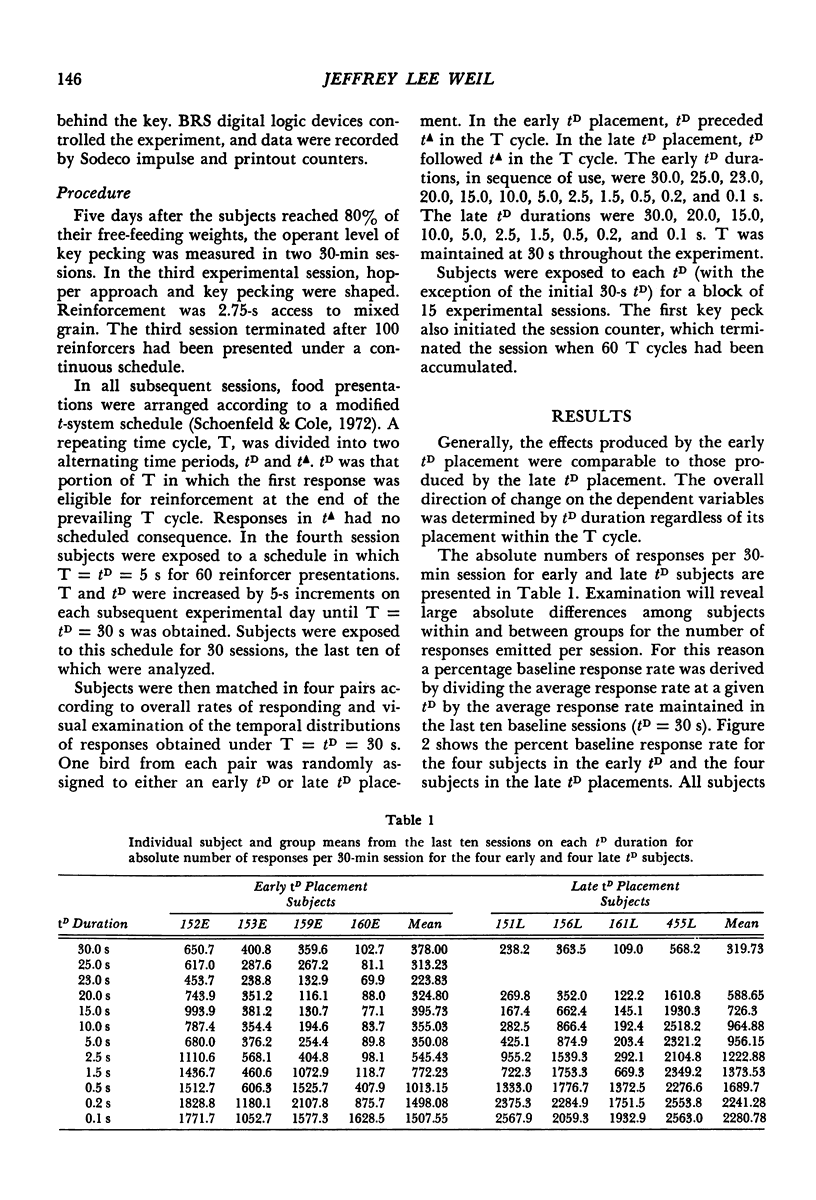

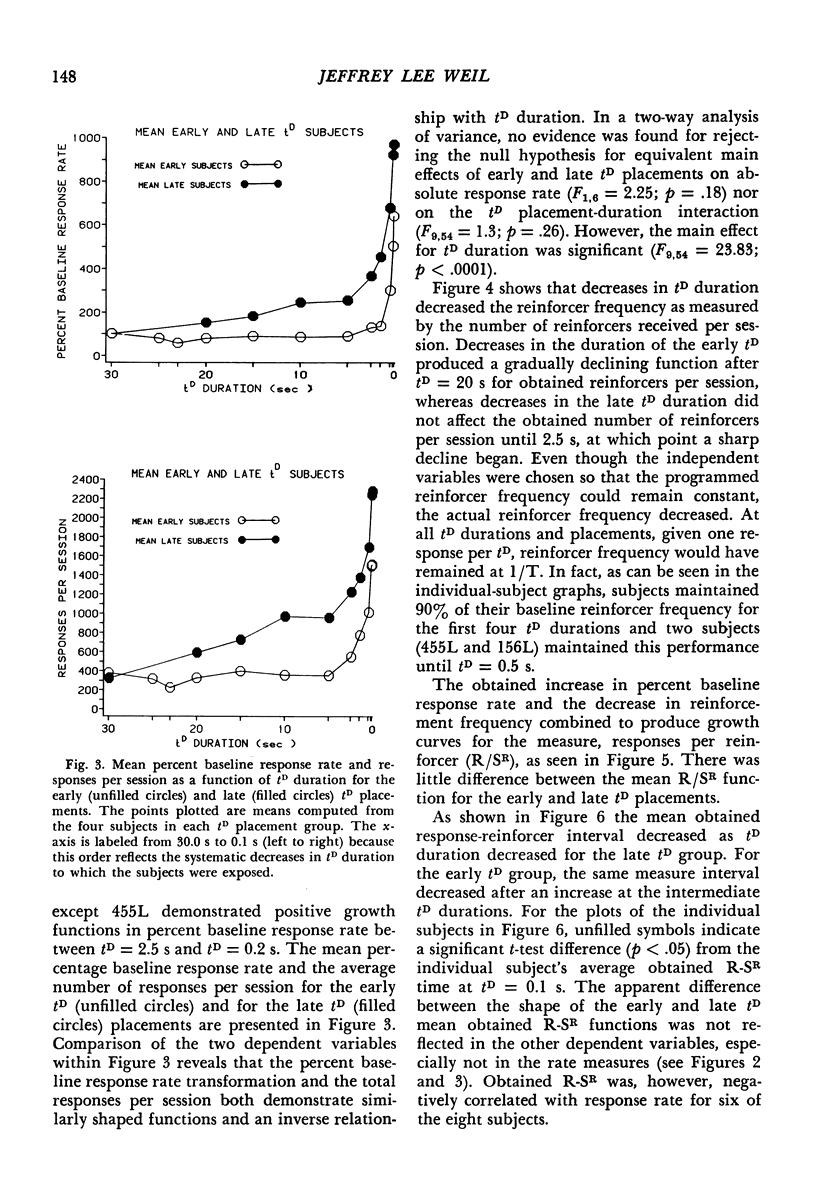
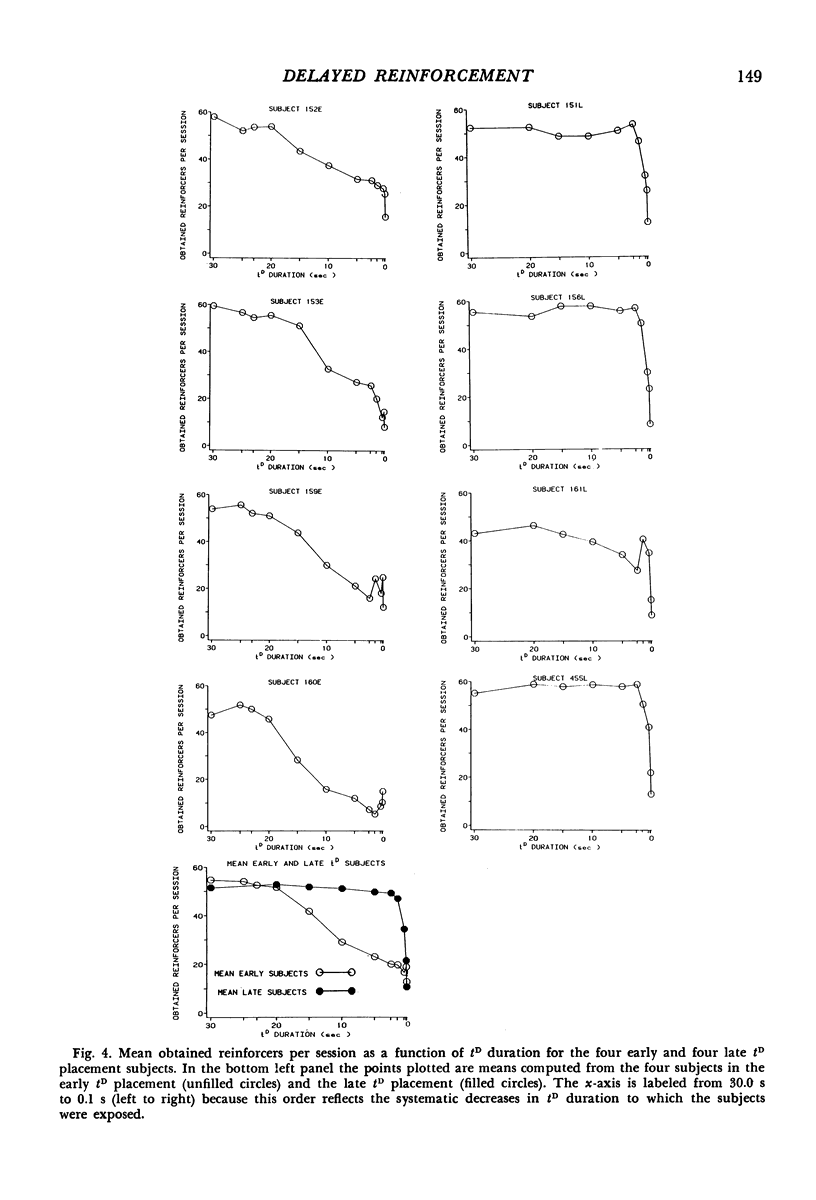
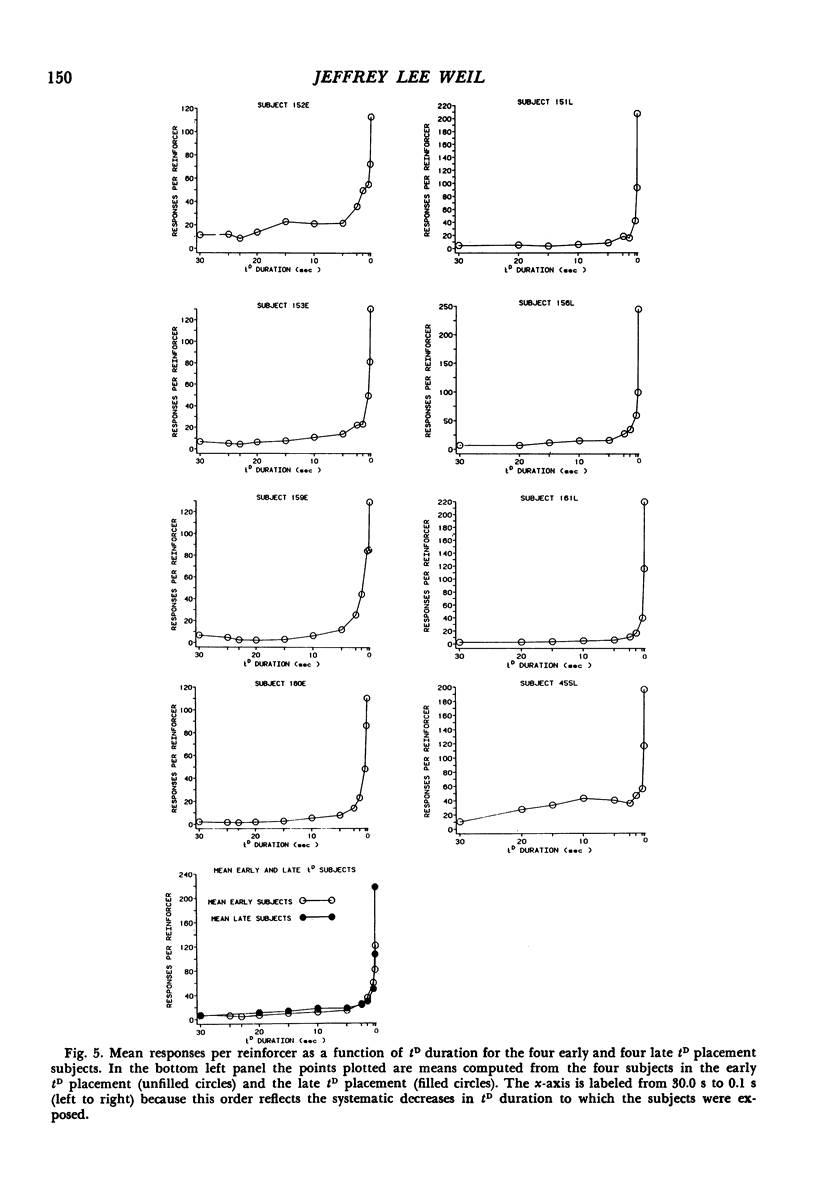
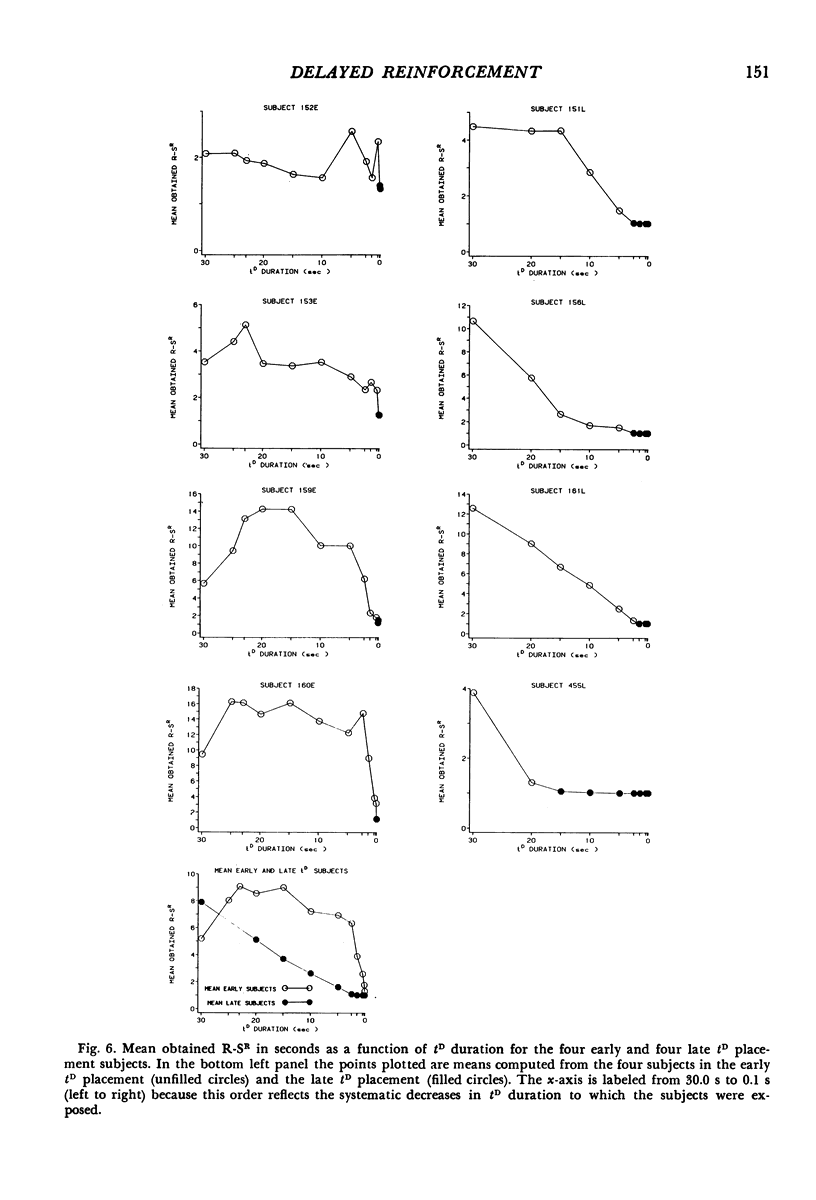
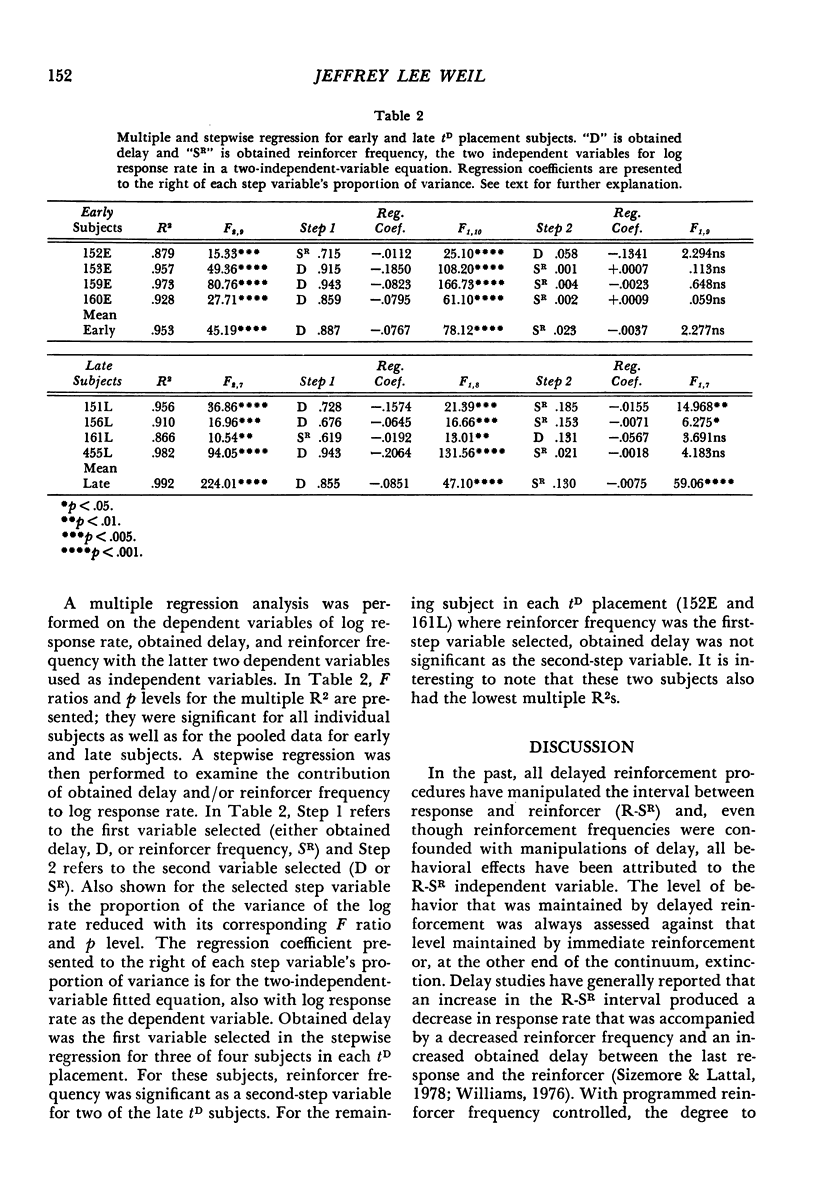


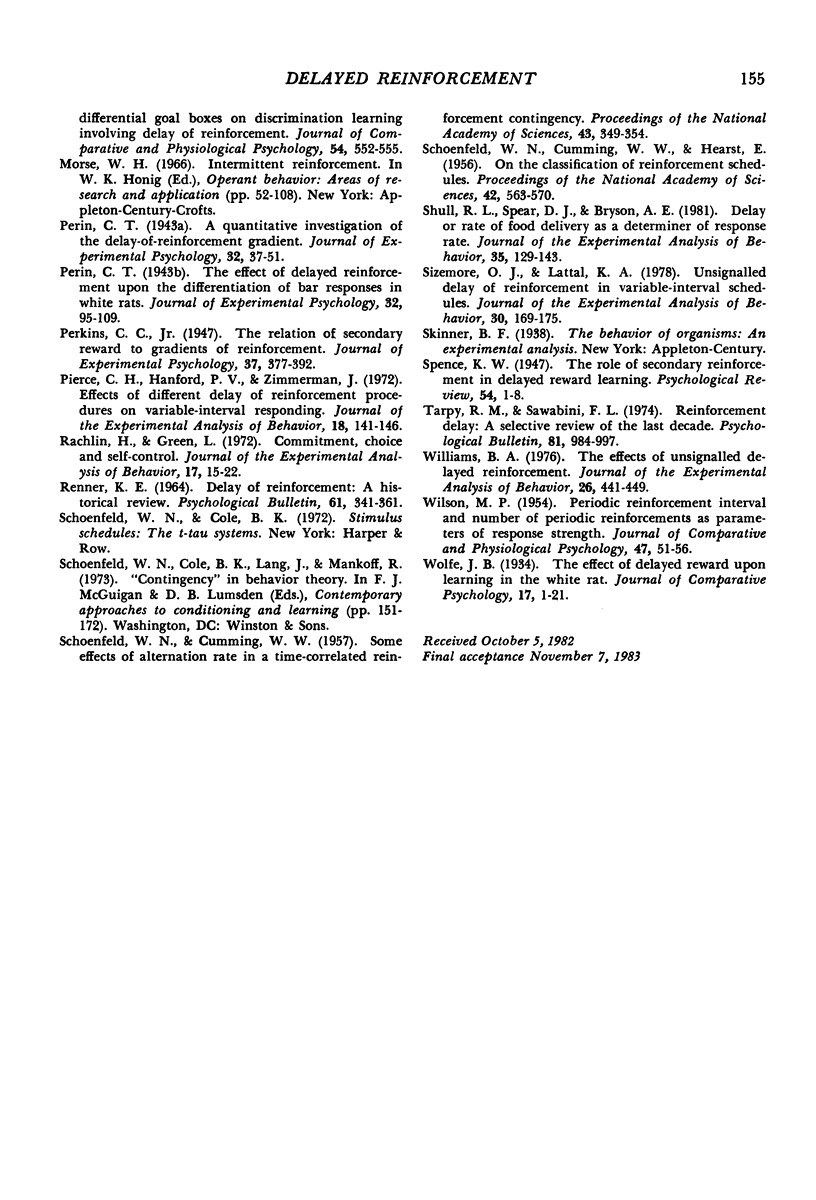
Selected References
These references are in PubMed. This may not be the complete list of references from this article.
- Ainslie G. Specious reward: a behavioral theory of impulsiveness and impulse control. Psychol Bull. 1975 Jul;82(4):463–496. doi: 10.1037/h0076860. [DOI] [PubMed] [Google Scholar]
- Baron A., Kaufman A., Fazzini D. Density and delay of punishment of free-operant avoidance. J Exp Anal Behav. 1969 Nov;12(6):1029–1037. doi: 10.1901/jeab.1969.12-1029. [DOI] [PMC free article] [PubMed] [Google Scholar]
- Catania A. C., Reynolds G. S. A quantitative analysis of the responding maintained by interval schedules of reinforcement. J Exp Anal Behav. 1968 May;11(3 Suppl):327–383. doi: 10.1901/jeab.1968.11-s327. [DOI] [PMC free article] [PubMed] [Google Scholar]
- Chung S. H. Effects of delayed reinforcement in a concurrent situation. J Exp Anal Behav. 1965 Nov;8(6):439–444. doi: 10.1901/jeab.1965.8-439. [DOI] [PMC free article] [PubMed] [Google Scholar]
- Chung S. H., Herrnstein R. J. Choice and delay of reinforcement. J Exp Anal Behav. 1967 Jan;10(1):67–74. doi: 10.1901/jeab.1967.10-67. [DOI] [PMC free article] [PubMed] [Google Scholar]
- Clark F. C. The effect of deprivation and frequency of reinforcement on variable-interval responding. J Exp Anal Behav. 1958 Aug;1(3):221–228. doi: 10.1901/jeab.1958.1-221. [DOI] [PMC free article] [PubMed] [Google Scholar]
- Clark R. Some time-correlated reinforcement schedules and their effects on behavior. J Exp Anal Behav. 1959 Jan;2(1):1–22. doi: 10.1901/jeab.1959.2-1. [DOI] [PMC free article] [PubMed] [Google Scholar]
- DEWS P. B. Free-operant behavior under conditions of delayed reinforcement. I. CRF-type schedules. J Exp Anal Behav. 1960 Jul;3:221–234. doi: 10.1901/jeab.1960.3-221. [DOI] [PMC free article] [PubMed] [Google Scholar]
- Findley J. D. Preference and Switching under Concurrent Scheduling. J Exp Anal Behav. 1958 Apr;1(2):123–144. doi: 10.1901/jeab.1958.1-123. [DOI] [PMC free article] [PubMed] [Google Scholar]
- HEARST E. The behavioral effects of some temporally defined schedules of reinforcement. J Exp Anal Behav. 1958 Jan;1:45–55. doi: 10.1901/jeab.1958.1-45. [DOI] [PMC free article] [PubMed] [Google Scholar]
- Hursh S. R., Fantino E. Relative delay of reinforcement and choice. J Exp Anal Behav. 1973 May;19(3):437–450. doi: 10.1901/jeab.1973.19-437. [DOI] [PMC free article] [PubMed] [Google Scholar]
- Killeen P. On the measurement of reinforcement frequency in the study of preference. J Exp Anal Behav. 1968 May;11(3):263–269. doi: 10.1901/jeab.1968.11-263. [DOI] [PMC free article] [PubMed] [Google Scholar]
- LAWRENCE D., HOMMEL L. The influence of differential goal boxes on discrimination learning involving delay of reinforcement. J Comp Physiol Psychol. 1961 Oct;54:552–555. doi: 10.1037/h0046981. [DOI] [PubMed] [Google Scholar]
- Pierce C. H., Hanford P. V., Zimmerman J. Effects of different delay of reinforcement procedures on variable-interval responding. J Exp Anal Behav. 1972 Jul;18(1):141–146. doi: 10.1901/jeab.1972.18-141. [DOI] [PMC free article] [PubMed] [Google Scholar]
- RENNER K. E. DELAYED OF REINFORCEMENT: A HISTORICAL REVIEW. Psychol Bull. 1964 May;61:341–361. doi: 10.1037/h0048335. [DOI] [PubMed] [Google Scholar]
- Rachlin H., Green L. Commitment, choice and self-control. J Exp Anal Behav. 1972 Jan;17(1):15–22. doi: 10.1901/jeab.1972.17-15. [DOI] [PMC free article] [PubMed] [Google Scholar]
- Schoenfeld W. N., Cumming W. W., Hearst E. ON THE CLASSIFICATION OF REINFORCEMENT SCHEDULES. Proc Natl Acad Sci U S A. 1956 Aug;42(8):563–570. doi: 10.1073/pnas.42.8.563. [DOI] [PMC free article] [PubMed] [Google Scholar]
- Schoenfeld W. N., Cumming W. W. SOME EFFECTS OF ALTERNATION RATE IN A TIME-CORRELATED REINFORCEMENT CONTINGENCY. Proc Natl Acad Sci U S A. 1957 Apr 15;43(4):349–354. doi: 10.1073/pnas.43.4.349. [DOI] [PMC free article] [PubMed] [Google Scholar]
- Shull R. L., Spear D. J., Bryson A. E. Delay or rate of food delivery as determiners of response rate. J Exp Anal Behav. 1981 Mar;35(2):129–143. doi: 10.1901/jeab.1981.35-129. [DOI] [PMC free article] [PubMed] [Google Scholar]
- Sizemore O. J., Lattal K. A. Unsignalled delay of reinforcement in variable-interval schedules. J Exp Anal Behav. 1978 Sep;30(2):169–175. doi: 10.1901/jeab.1978.30-169. [DOI] [PMC free article] [PubMed] [Google Scholar]
- WILSON M. P. Periodic reinforcement interval and number of periodic reinforcements as parameters of response strength. J Comp Physiol Psychol. 1954 Feb;47(1):51–56. doi: 10.1037/h0057224. [DOI] [PubMed] [Google Scholar]
- Williams B. A. The effects of unsignalled delayed reinforcement. J Exp Anal Behav. 1976 Nov;26(3):441–449. doi: 10.1901/jeab.1976.26-441. [DOI] [PMC free article] [PubMed] [Google Scholar]


